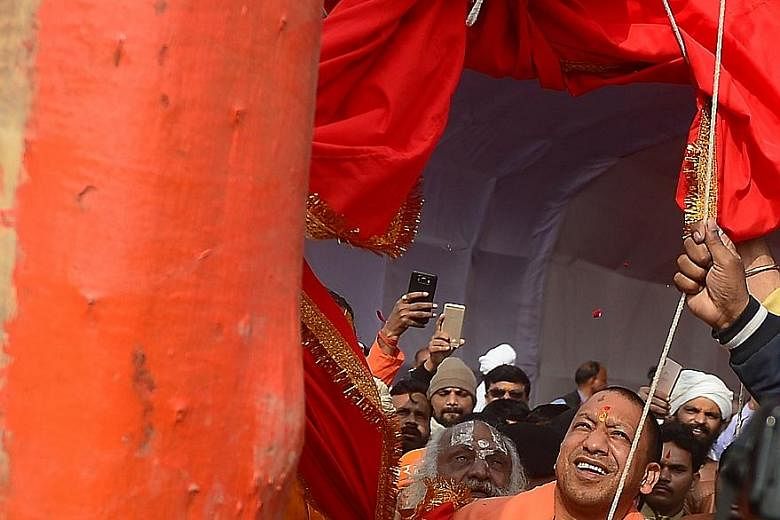A tie-up between two rival regional parties in India's most populous and politically important state Uttar Pradesh could hurt Prime Minister Narendra Modi's ruling Bharatiya Janata Party (BJP) at the polls this year.
In the 545-seat Lower House of Parliament in the capital New Delhi, the northern state accounts for 80 parliamentary seats - the most among all the states. The BJP holds 69 of those seats.
Long-time rivals Samajwadi Party (SP) and Bahujan Samaj Party (BSP) have announced a tie-up to take on the BJP in the next general election, which must be held by May. The two parties will contest 38 seats each.
The SP or Socialist Party is led by Mr Akhilesh Yadav, and its support base is made up of Muslims and Yadavs, traditionally a caste involved in agriculture. The BSP is led by Ms Mayawati, a leader of the Dalits, who at one time were called untouchables.
Analysts said the tie-up could turn out to be a formidable alliance against the BJP.
The Hindu nationalist BJP garnered a landslide win in the 2014 general election, partly because it won 71 seats in Uttar Pradesh, which gave it a final tally of 282 out of 543 seats in the Lower House. Subsequent by-elections in Uttar Pradesh saw the number of BJP-held seats falling to 69.
Dr Sandeep Shastri, a political analyst and pro-vice-chancellor of Jain University, said: "Uttar Pradesh becomes very important for the BJP. If they lose numbers, it has a very significant impact... The BJP will have to take into account that if the SP and BSP votes get pooled, it becomes a big chunk.
"The moot question is: Will political arithmetic combine with electoral chemistry? For the last two to three decades, these parties have been intense rivals. So, for local leaders of both parties to work together, it would be very interesting to see."
The SP and BSP, as an experiment, worked together in by-elections last year in Gorakhpur and Phulpur, both in Uttar Pradesh, and managed to take the two seats from the BJP. The ruling party is also facing anti-incumbency sentiment in the state.
Uttar Pradesh, with a population of about 220 million people, has always been a political battleground that has shaped national politics because of its large representation in Parliament.
It is often said that the road to Delhi runs through Uttar Pradesh, meaning it plays a critical role in winning national elections .
In the 2014 polls, Mr Modi signalled the importance of the state for the BJP by contesting and winning in the holy city of Varanasi. The main opposition Congress party won 44 seats across the country, SP had five in Uttar Pradesh and BSP did not win any seats.
Analysts said the coming together of the two regional parties signalled the beginning of some form of consolidation of the opposition parties.
Mr Nilanjan Mukhopadhyay, a Delhi-based writer and journalist, said: "The tie-up opens up multiple battles for Mr Modi. It is not Mr Modi against one person. He has to face different challenges in different states.
"It makes things more difficult than it appeared a few weeks ago for Mr Modi, especially after the state election results in the three states."
The three states were Madhya Pradesh, Rajasthan and Chattisgarh.
The BJP received an electoral jolt in those polls last month, losing the three stronghold states to Congress, though Mr Modi remains the most popular leader in the country.
The loss is seen to have invigorated the opposition parties, including Congress, which is trying to cobble together its own alliance.
Still, the BJP has dismissed talk that the SP-BSP alliance will hurt it. Uttar Pradesh Chief Minister Yogi Adityanath, a member of the BJP, told reporters that the alliance was "created out of fear of the BJP".
He said: "This is politics of trade, which will not be accepted by the people of the state."
But Dr Anil Kumar Verma, chairman of the Centre for the Study of Society and Politics, a research institute in Uttar Pradesh, said the BJP was starting to look nervous.
The SP and BSP will be canvassing for each other's candidates, and Dr Verma said it remains to be seen if SP supporters will vote for a BSP candidate and vice versa.
He added that it is also unclear if the BSP-SP alliance will work out. If it does not, "the BJP doesn't have to panic, it's all a game of numbers", said Dr Verma.

